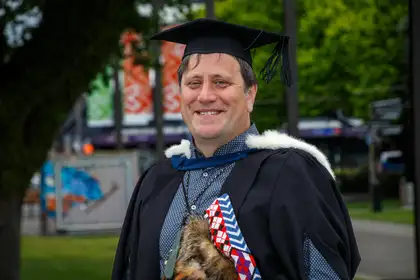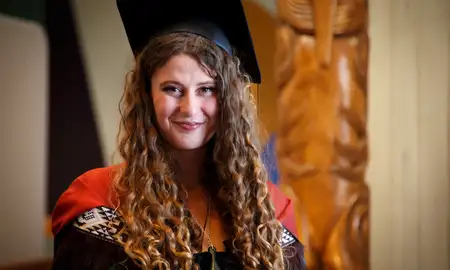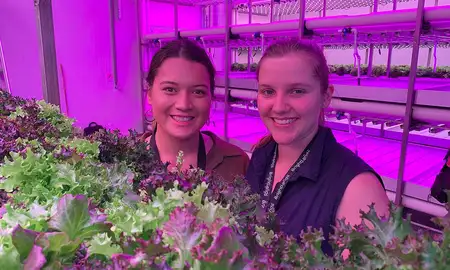
Since the early 2000s, Bede’s career path had been firmly placed within the information technology industry, particularly in software development and design, as well as consulting for Fortune 500 companies in North America and in northern Europe.
A new opportunity called when Bede’s mother bought shares in land belonging to her great grandmother, which had been gifted to the family as a reward for a pre-European Māori land battle. Around 1834, betrayal from a section of the Te Aitanga a Mahaki tribe lead to an invasion of the land, with the occupied people calling for assistance by their distant relatives. Among those who answered the call was Te Wera Hauraki and several other chiefs who helped overpower the invaders, resulting in the block of land adjoining the battlefield to be named Rangatira as a mark of respect and appreciation.
The land, which once grew grapes, now hosts a mix of green kiwifruit and G3 gold kiwifruit and is managed in partnership with Thompson’s Horticulture. Bede says he was motivated by opportunity as well as his mother’s request that he study the history of the land to help him manage and work with their partners to grow the fruit.
“While participating in workshops put on by Willie Te Aho in conjunction with Te Aitanga a Mahaki as part of the Tūranga Whenua, Tūranga Tangata project, I decided to pursue horticulture. High value horticulture is a foundation in improving our whenua and financial outcomes for Māori. I chose Massey, not only because the lockdowns and travel restrictions made the distance learning degree a viable option, but because of a presentation given by Massey grad Summer Wynard at the Rongopai marae. Summer was a scholarship recipient of both Mangatu Blocks Incorporation and Wi Pere Trust, and I was impressed after hearing about her studies in horticulture and decided on Massey for my new path.”
While it was a big change returning to study, Bede says he found that managing his time was a vital factor in succeeding and that his previous experiences worked in his favour.
“Time management and sticking to planned study intervals were very important, particularly as I was still working. However, I found that my years of working late into the night programming and trying to decipher instructions translated well to my study journey. I really enjoyed the on-campus workshops and having the chance to meet my peers. It helped keep up the motivation and enthusiasm to do well.”
Bede says he also enjoyed the opportunity of getting out into the field as part of his studies.
"I spent a summer working for Thompson’s Horticulture in Gisborne for my practicum report. At that time, they were mostly focused on growing and managing kiwifruit orchards on the East Coast and eastern Bay of Plenty. My work involved kiwifruit thinning and canopy management over several properties. I enjoyed the outdoor work in the beautiful Gisborne sun, working with newly discovered relations and backpackers from many different nations and managing to lose a few kilograms while topping up my bank account!”
Another project for the last part of his degree saw Bede working much closer to home.
“My last paper was on farms and horticultural power usage, so my mother, who is a current trustee on the Wi Pere Trust, commissioned me to perform an electrical power usage study. I was able to outline a more in-depth power usage report based on actual usage rather than billed usage. With some research and investigation, I was able to produce a report with recommendations that if implemented, could reduce our billed power costs conservatively by $20-$30k per annum.”
The 45-year-old says completing his degree has been a standout moment for him and there’s the potential for more study on the horizon.
“Finishing my studies and managing to attain A’s in a number of papers after hours of hard work and research has meant I finally get my picture on the wall of achievement in our family home, alongside my siblings with their degrees, master’s and doctorates. I’m looking into my master’s, but next up is working on our whenua over the summer to increase its productivity and improve the riparian environment.”
When asked what his secret to success is, Bede says, “It’s about being competitive and having the motivation and perseverance to succeed, but also budgeting your time and money, and reaching out for help when you need it.”
He also says support always helps.
“I am very grateful for the support of my parents, in particularly my mother Trudy Meredith for her support and for sewing my own cloak to wear for graduation. The colours and motifs are based on our family history and folklore. Also, for the support from the Wi Pere Trust for the horticultural sponsorship and tertiary benefits, and to Mangatu Blocks Incorporation for their education grants as well. Deep thanks to Eddie Collins and Wayne Hall for letting me use the Wi Pere Horticulture Unit for my practicum two paper.”
Related news
Finding drive in a new perspective
With the pandemic delaying his plans to travel overseas, Matt Tini, Waikato, Ngāti Tiipa, Ngāti Rākaipaaka, Ngāti Kahungunu, decided to broaden his horizons by continuing his academic journey.

Sharing the mana through connecting passions
Talia Brewer, Te Ātiawa ki Whakarongotai, Ngāti Raukawa ki te Tonga and Ngāti Toa Rangatira, Ngāti Ruanui, Ngā Ruahine, is graduating not only with a Master of Applied Social Work but with a reinforced sense of self and purpose.

Chance encounter leads Summer to horticulture
In her final months at secondary school, Summer Wynyard thought she was going to be a doctor, but a chance encounter would see her focus more on plants than humans.
